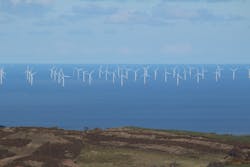CGG joins Irish Sea ECOWind-ACCELERATE project
Offshore staff
PARIS, France – CGG says that it has been designated as a “special technical partner” in a research project led by Bangor University in North Wales.
The project is designed to identify opportunities that benefit biodiversity and the conservation of species around offshore windfarms. Another goal is to support windfarm developers to design long-term environmental monitoring strategies.
The four-year ECOWind-ACCELERATE project will use data supplied by Mona Offshore Wind (a joint venture between EnBW and BP), Eni, Ørsted, RWE and The Met Office, with funding from the UK Natural Environment Research Council (NERC) and The Crown Estate, and support from the Department for Environment, Food and Rural Affairs as part of the ECOWind program.
CGG will provide computing resources (from its global capacity of 310 petaflops), for climate and sediment transport modeling to determine the impact of offshore windfarms and climate trends in the East Irish Sea.
In addition, CGG will contribute machine learning (ML) drawing on its experience from previous research projects with Bangor University on the use of ML for automated species identification, substrate and habitat classification in the Irish Sea to map benthic habitats, natural capital and biodiversity net gain/loss in this area.
CGG’s Geoscience Laboratories will perform analysis of seabed properties including grain characterization, mineralogy, geochemistry, and meiofaunal surveys. And its environmental science specialists will analyze the impact of offshore windfarms on fish behavior and the interaction between seabed habitat, predator and prey interaction.
09.14.2022
